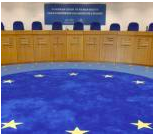The European Court of Human Right convicted Turkey of violating right to fair trial in the case of Cevat Soysal who was convicted to 18 years and 9 months of prison by Turkish courts of being a PKK leader.
The applicant claimed that Turkey violated Article 6 of the European Declaration of Human Rights.
Soysal also claimed that Turkish courts included transcripts of unverified phone conversations, declined to provide a copy for further analysis and refused to hear witnesses.
ECHR admitted Soysal’s complaints and ruled that Turkey violated Articles 6/1 and 6/3 of the Convention. The court ordered Turkey to pay the applicant 7,500 euros as non-pecuniary damages and 2,500 as court expenses.
Trial took 3 years
On 7 July 1999 the Ankara Magistrates’ Court ordered the Soysal’s arrest in absentia on suspicion of membership of the PKK, an illegal organization.
On 13 July 1999 he was captured in Chisinau, Moldova, and taken to Turkey on the same day. He was interrogated by MIT (the National Intelligence Organization of Turkey) agents until 21 July 1999.
In July 1999, shortly after being taken to Turkey, Soysal was described by a number of media outlets as the “second man of the PKK”, the “European representative of the PKK”, “a terrorist” and “a traitor to the country”.
On 9 August 1999 the public prosecutor at the Ankara State Security Court filed a bill of indictment against Soysal and two other persons. The applicant was charged with being a leading member of the PKK, whose aim was to bring about the secession of part of the national territory. The charges against the applicant were brought under Article 125 of the former Criminal Code.
The public prosecutor accused the applicant of being one of the leaders of the PKK in Europe and of having been involved in the training of PKK members in Romania. According to the indictment, the applicant had been in contact with Mr Abdullah Öcalan, the leader of the PKK, and had provided him with information about the persons who had been trained. The public prosecutor further noted that when he had questioned Mr Öcalan on 22 February 1999, the latter had maintained that he had given instructions to the applicant regarding that training. Moreover, the leader of the PKK had confirmed the veracity of that statement during his trial on 1 June 1999.
The public prosecutor at the Ankara State Security Court further claimed that during telephone conversations with a number of people in Turkey, the applicant had issued instructions to perpetrate acts of violence following the arrest of Mr Öcalan.
During the second hearing on 14 October 1999 the applicant’s lawyer asked the court, inter alia, to remove the transcripts of the applicant’s alleged telephone conversations from the case file. The public prosecutor demanded that the request be refused, and the court duly dismissed it.
As a result, the public prosecutor alleged that the applicant had issued instructions for hundreds of bombings, fires, hunger strikes, suicide attacks and massacres.
The lawyer requested the court to order a comparative voice analysis and to enquire whether the phone tapping had been conducted in accordance with the legal procedure and on the basis of a court order. He also asked the court to find out the identities of the persons with whom the applicant had allegedly spoken (designated as “X” in the documents in the case file) and to take statements from them about those conversations.
On the same day the Ankara State Security Court accepted the request for a comparative voice analysis and dismissed the remaining requests without providing any reasons.
The court allowed his request and asked TRT (Radio and Television Corporation of Turkey), the national public broadcaster, to assign impartial experts to conduct the analysis and to prepare a report.
On 25 June 2002 the Ankara State Security Court rendered its judgment in the case. The applicant was convicted of membership of the PKK under Article 168 § 1 of the former Criminal Code and sentenced to eighteen years and nine months’ imprisonment.
According to the court, a direct link between the acts of terrorism, in particular the attack on Mavi Çarşı on 13 March 1999, and the applicant’s instructions could not be established.
On 12 December 2002 the Court of Cassation upheld the judgment of the Ankara State Security Court.
On 30 November 2008 Soysal was released from prison on probation and returned to Germany, where his family were living. (AS/BM)
* Click here to read the article in Turkish.











